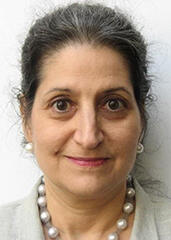The benefits
Students have overwhelmingly found the skills in this class to be fruitful for navigating both personal and professional settings. Kaboolian establishes a safe space to practice strategies they are not comfortable with so they have a broader set to draw on and can approach negotiations from a place of self-reflection and centeredness. She frequently gets calls from a range of students to celebrate how applying course materials led to successful milestones like starting salaries, book publishing deals, and residency selections.
“That’s what education is: putting people at the edge of discomfort and then creating a space for them to take that risk.”
The challenges
Conducting this course online last year due to the COVID-19 pandemic was difficult to navigate. Kaboolian notes that vulnerability is essential to learning new negotiation strategies. Some students found it challenging to be vulnerable digitally while others were more comfortable being vulnerable via Zoom than in-person. To navigate this unbalance, she leaned on guidance on remote teaching and facilitation, which she notes helped produce “astoundingly” positive student feedback.
Takeaways and best practices
-
Peer interaction and feedback are essential.
“Students care a lot about what their peers have to say and think, in many ways more than they might care about the instructor’s opinions.” Eliciting feedback from peers about how a negotiation went—for instance, how they reacted to a given strategy—and then giving the student an opportunity to reflect on how they might revise their approach in real-time can alter students’ opinions and behaviors in ways instructor-only feedback could not.
-
Set clear classroom norms and take a problem-solving approach.
When dealing with materials that impact students, as Kaboolian describes, “below the neck,” it is especially essential to generate and agree to clear classroom norms to ensure that people treat each other with mutual respect. In addition, when students share views that others might disagree with, Kaboolian takes a “problem-solving approach,” asking the student to think through how to address it in changing circumstances so everyone can learn from the moment.
-
Use assessments that evaluate students where they are.
With the range of styles, Kaboolian finds that “comparative” assessments of how much a student got from a negotiation doesn’t productively capture what students learn when things don’t work out. Rather, she invites conversations when things fall flat, and instead assesses students on how and whether they were able to achieve their goals for themselves in that given context.
Bottom line
Kaboolian emphasizes that every class, no matter the content, should reflect on how to support students in moving “from fear to enthusiasm.” This should include both creating both tasks that meet and challenge students where they are, as well as an environment that will catch them when they fail. “That’s what education is,” she reflects, “putting people at the edge of discomfort and then creating a space for them to take the risk.”
 Linda Kaboolian, Instructor at Harvard T.H. Chan School of Public Health, teaches Negotiations for public health students who will continue to practice these skills in everyday and high-stakes settings all around the world. “I’m a social scientist,” she explains, “so I’m very concerned about how to modify practice as a negotiator to be relevant to the context you’re working with.” Kaboolian underscores the importance of understanding the power dynamics and cultural context at play before negotiating. She designs stylized cases steeped in research on culture and scaffolded in complexity, building from one-on-one discussions to multi-stakeholder, multi-issue dilemmas.
Linda Kaboolian, Instructor at Harvard T.H. Chan School of Public Health, teaches Negotiations for public health students who will continue to practice these skills in everyday and high-stakes settings all around the world. “I’m a social scientist,” she explains, “so I’m very concerned about how to modify practice as a negotiator to be relevant to the context you’re working with.” Kaboolian underscores the importance of understanding the power dynamics and cultural context at play before negotiating. She designs stylized cases steeped in research on culture and scaffolded in complexity, building from one-on-one discussions to multi-stakeholder, multi-issue dilemmas.
